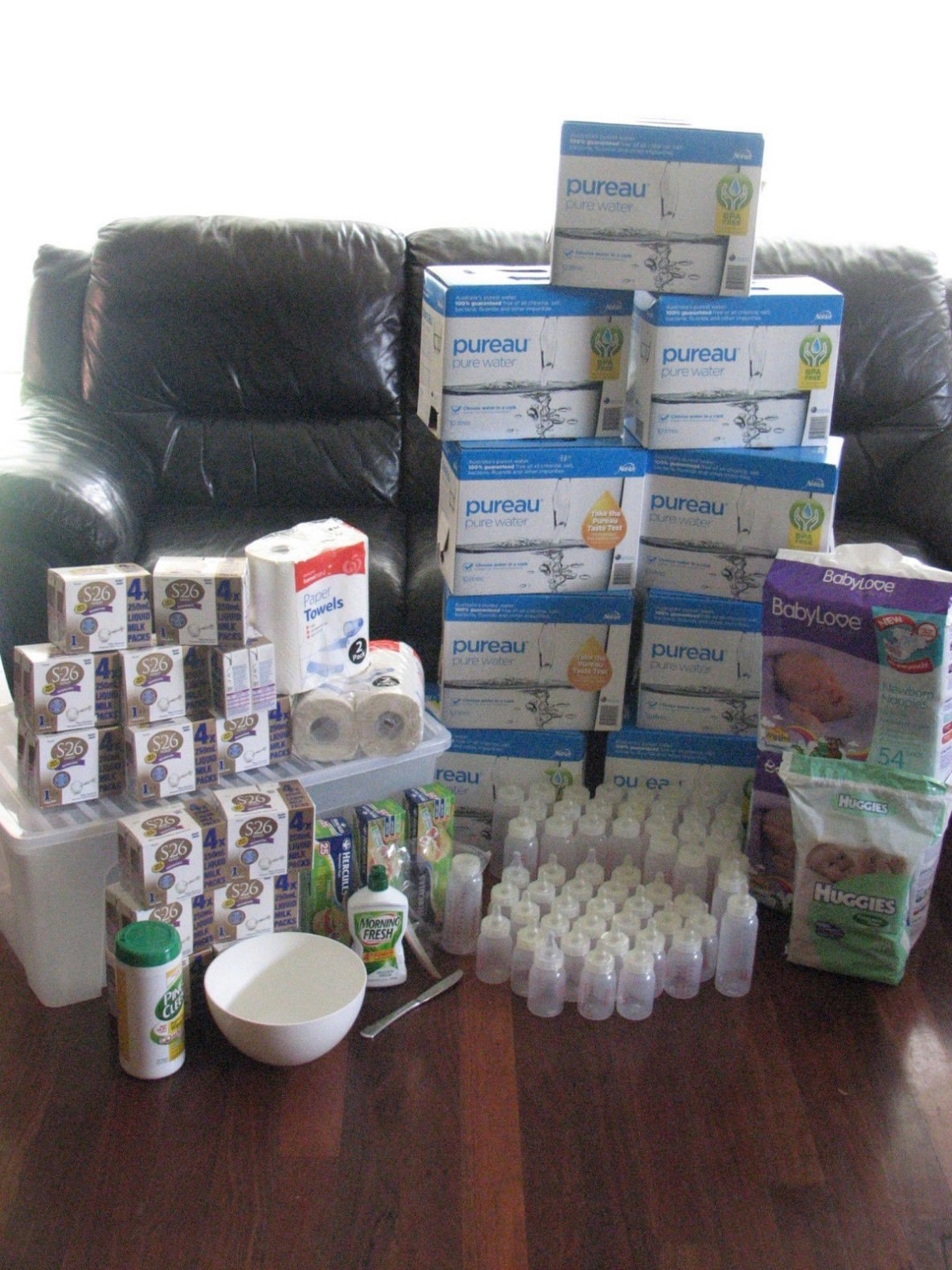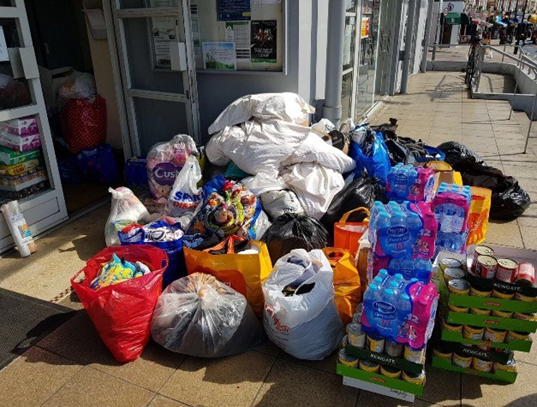Guidance is needed on infant and young child feeding for families in the UK affected by disasters and emergencies.
Heather Trickey and Helen Gray
Disaster and emergency situations – floods, fires, terrorist attacks and widespread power failures – can affect any country, including the UK. In any disaster or emergency, babies are vulnerable and continued access to adequate and safe nutrition is essential. Families need support to ensure that children continue to be cared for and fed in line with their needs.
There is no UK government plan
The World Health Assembly has recommended that all countries implement existing global guidelines on infant feeding during emergencies, including specific operational guidance to help relief agencies protect infant nutrition and minimise risk of infection. Although there is national guidance on care of animals during emergencies, a recent World Breastfeeding Trends Initiative (WBTi) report found that there are no UK-wide or national strategies addressing infant and young child feeding during a disaster. Scotland is the only part of the UK that has a named lead on infant feeding in emergencies. Emergency planning and response is devolved to local authorities; because there is no guidance to appropriately include protection of families with infants there is no way to ensure that local strategies consider infant nutrition as part of emergency response.

Risks for formula fed babies
Babies who are fully or partially formula fed are at risk if their caregivers lose access to clean water, ability to sterilise feeding equipment and when supplies of formula milk are disrupted or contaminated. A clean environment for preparation and storage of feed, sterilising equipment, boiling water and a refrigerator are necessary to prevent bacterial contamination.
Emergency supplies required to care for and feed a baby for one week in a developed country, using ready-to-use milk Emergency preparedness for those who care for infants in developed country contexts. Gribble, Karleen and Berry Nina International Breastfeeding Journal20116:16
Risks for breastfed babies
Breastfeeding protects against infection and can be comforting to infants and mothers during difficult times. Mothers’ supply of breastmilk is resilient, however, chaos, displacement and emotional strain, coupled with commonly held misconceptions about how breastfeeding works, can undermine a mother’s confidence and result in less frequent feeding. Breastfeeding mothers need access to the option of feeding in a private space and reassurance that continuing to breastfeed is the best option for their baby.
Skilled support can help mothers resolve breastfeeding problems and maintain the protective effect of full or partial breastfeeding. If breastfeeding helpers are not pre-authorised as part of planned disaster response the immediate help that families need can be delayed.
Risks associated with donated formula milk
The world is a better place than we sometimes think. When a disaster strikes, ordinary people often respond with an outpouring of generosity. We give clothes, equipment and food spontaneously and in response to public calls.

Donations of clothing, bedding, toys, food and water, London, June 2017. Photo credit: @balhammosque
In the absence of guidance, agencies responsible for co-ordinating emergency response and volunteers working on the front line are often not aware that donations of formula milk can put babies at risk. Risks from donated formula milk include inadvertently distributing products that are unsuitable for babies under six months or for babies with special nutritional needs, as well as distributing milk that is contaminated or out-of-date. There is also a risk that donations will be inappropriately provided to parents of breastfed babies, this can undermine the protective effect of breastfeeding and cause parents to become dependent on a continued supply of formula milk.
International guidelines for emergency feeding caution against accepting donations of formula milk. It is recommended that emergency planners and first responders, with expert advice, take responsibility for purchase and distribution of appropriate formula milks in line with the needs of each family.
What’s been done so far?
Several UK agencies have developed guidance with limited scope. The Food Safety Agency has issued guidance to support safe preparation of formula milk in response to flooding and contamination of local water supplies. A toolkit has also been developed to support foodbanks, including preventing and managing unsolicited formula milk donations.
How to help ensure babies’ nutritional needs are protected
In the absence of national guidance, relief co-ordinators and agencies and members of the public will be concerned to do the right thing in response to a disaster. There is an urgent need to improve planning and raise awareness about the best ways to support infant and child feeding. These key points from have been adapted from UK and international guidance:
1) Members of the public
- DO donate money to key agencies. This is the best way to support parents who need to buy formula milk. Money will allow parents, caregivers or coordinating aid organisations to buy the most appropriate milk to meet the individual needs of each baby. Donated formula milk can inadvertently put babies at risk.
- DO offer your time to help agencies co-ordinating relief. Support and encourage mothers who are breastfeeding. Breastfeeding is protective against infection, and provides the baby with the safest possible nutrition.
2) Relief workers and aid agencies
- DO have a local plan to support infant and young child feeding in emergencies in place for local authorities, first responders and aid agencies. All families should be screened to ensure they receive appropriate support or supplies.
- DO ensure that mothers who are fully or partially breastfeeding have the support they need to continue. Mothers can seek support from their midwife or health visitor. Local emergency planning should have identified appropriate infant feeding support from local health and voluntary services. There are telephone helplines which support caregivers with all aspects of infant feeding:a. NCT helpline (0300 330 0700)
b. The Breastfeeding Helpline (0300 100 0212)
- DO encourage donations of money to recognised agencies so that parents, caregivers and agencies can buy any formula or supplies needed, rather than donations of formula products.
- Appropriate support or supplies including cash cards specifically for the purchase of infant formula and complementary foods for young children could be considered.
- DO ensure that formula milk is purchased and distributed only for babies who need formula milk, following basic screening of families (simple triage tools have been recently been developed for use in emergency situations in Greece and Canada).
- DO NOT distribute formula milk in an untargeted way.
- DO ensure that parents are aware of guidance on sterilisation of bottles and teats and how to prepare any powdered formula safely and have access to facilities to carry this out, to reduce the risk of contamination. Liquid ready-to-feed formula may be needed if suitable preparation facilities are not available.
What is needed now?
There is an urgent need for UK governments to ensure infant and child nutrition is protected as part of the planned new strategy for resilience in major disasters. Local authorities and relief agencies require national guidance to develop local strategies so that we can all be better prepared.
Heather Trickey is a Research Associate based in DECIPHer, Cardiff University. Her research focuses on public health policy and parents, particularly Infant Feeding Policy.
Helen Gray is Joint Coordinator of the World Breastfeeding Trends (WBTi) UK Working Group.